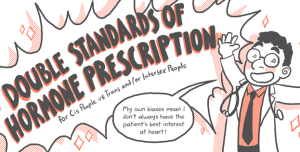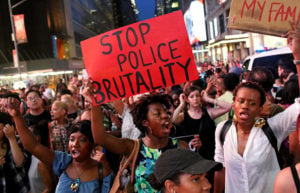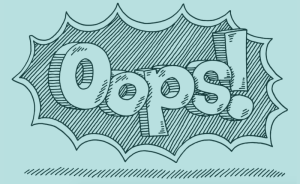
A person sits on a bench holding a cup of coffee, looking worried.
Two college students return to campus after both were present for an act of violence.
One of them was physically injured in the incident. In order to return to class, he asks to have space around his desk to allow him to stretch, because sitting still for too long would aggravate his injury.
How would you feel about his request? Would you understand why such an accommodation would help him heal? Expect his professors to oblige?
Now, the other student’s pain isn’t visible – it’s emotional.
He wasn’t physically hurt, but he lost a loved one, and he’s traumatized. Certain reminders have resulted in panic attacks, and he’d rather not experience that again – especially not when he’s trying to move on with his life and get an education.
So he also makes a request, asking his professors if they can give him a warning before covering material that relates to the type of violence that took away his loved one.
How would you feel about this student’s request?
What he’s asking for is a content warning, also commonly called a trigger warning. And it’s a huge source of debate.
You may have come across some of this debate recently after the University of Chicago dean of students sent out a letter to tell incoming freshman not to expect trigger warnings.
People actually dismiss the needs of people with chronic illnesses and physical and visible disabilities quite often, so I don’t want to take away from that.
But it is noticeable that when it comes to an able-bodied person experiencing a temporary injury and needing support to heal, there’s usually not much debate about whether or not they should be allowed in class with crutches, a cast, or extra space around their desk.
The sharp contrast between this acceptance and common attitudes towards trigger warnings reveals something disturbing about our society’s approach to trauma and mental illness.
Just like it’s normal for the body to need healing after physical violence, it’s perfectly normal for someone’s mind to need healing after a traumatic event.
That’s why a diagnosis like Post Traumatic Stress Disorder (PTSD) exists – not because something’s “wrong” with someone who’s struggling after trauma, but because it’s natural for trauma to have an impact on one’s mental health.
But we don’t seem to understand that as a society. People like that dean and all of his supporters think that accommodations for traumatized students are unnecessary, and even wrong.
I’ve been through both sexual violence and intimate partner violence, and my recovery is an ongoing process.
I don’t experience panic attacks from reading about rape or partner abuse, but I do feel the impact when people are disparaging survivors of trauma. And I’m sure as hell not going to criticize other survivors for needing a warning.
That’s because I’ve also worked with many other survivors, and if there’s one thing I’ve learned about healing, it’s that it’s different for everyone. There’s no one “right” way to feel or respond to trauma.
But if you’re opposed to the use of trigger warnings, clearly you’ve taken the side that states there is such a thing as a “wrong” way.
So let’s not make the mistake of thinking this debate is only about trigger warnings. Let’s dig into how people really feel about trauma and mental illness when they decide that trigger warnings are wrong.
1. We View Mental Illness as a Weakness
On most college campuses, there’s a group of people who require protection from injury on a regular basis.
But we don’t call them weaklings – we call them athletes.
And you can bet that your school administration doesn’t complain about having to “coddle” your star football players by giving them helmets and padding before they take a hit.
But when a survivor wants to protect their mental health by getting a warning before they face a difficult topic, people frequently use the word “coddling” to refer to their needs.
Just read some of the recent comments on an Everyday Feminism article about trigger warnings:
“I cannot stand the wussification of American society.”
“If people are too fragile that a mere mention of their symptoms may bring back their trauma, they are certainly not good enough to engage in the academic world.”
These are common sentiments among those who oppose trigger warnings. They conflate being affected by trauma with being weak, and decide that those who need trigger warnings aren’t “good enough” to be among those who are unfazed.
This, in spite of the fact that so many survivors on college campuses aren’t there to avoid sensitive topics. They’re there to learn, just like everyone else, and they’re determined to do this in spite of their personal obstacles, just like everyone else.
Some people need to work full-time while they’re in college in order to attend school. Some need scholarships. Hell, everyone needs to pay for it somehow, so some rely on that parental trust fund that will get them through debt-free.
I hope you wouldn’t judge someone for having different financial needs than you do. Mental health needs are similar – accommodating them simply allows different people with different sets of circumstances to access the same opportunities that you have.
Facing difficult topics sure doesn’t make you weak. Facing them after directly experiencing trauma takes strength – even with the help of a warning.
You know what could also help people face difficult topics? A lifetime without ever being personally affected by trauma.
But I wouldn’t call you “weak” if that’s the reason you don’t need a warning.
2. We Define ‘Strength’ as Emotional Unavailability
Strength and healing can show up in so many different ways. Nothing has taught me this important lesson more than working with other survivors of violence.
For instance, while I did peer advocacy counseling with Community United Against Violence (CUAV), the oldest LGTBQIA+ anti-violence organization in the US, I met survivors who needed to face their trauma head-on, survivors who needed more time before they could talk about it, survivors who checked out emotionally at the mention of their trauma, and more.
None of them were wrong. Each was on their own unique path of learning to cope with what they’d been through.
Consider what it means that many of us are so eager to have engagement with disturbing topics in settings like college classrooms, but don’t want to actually acknowledge that these topics might disturb us.
I’m one of those who strongly believes that we should be engaging with issues like sexual violence, abuse, and violent oppression. That’s why I write about them so much.
So my support of trigger warnings doesn’t mean avoiding them altogether. I believe we should engage with them in a way that acknowledges their real impact.
If you think we should all approach traumatic topics with as much emotional engagement as we’d have for a math problem, then what you’re really asking is for people to disconnect from the emotions that naturally arise around emotional topics.
There’s nothing wrong with acknowledging that something is painful. But society says that people deserve to be punished for being “delicate” if they do.
I’ve heard people compare survivors needing trigger warnings to military combat veterans, saying that veterans don’t “whine” about society not taking care of their feelings.
But they say this as if veterans aren’t also suffering – as if they don’t have high rates of PTSD and suicide. Clearly, something needs to change if we believe that people are only strong if they endure painful feelings without support.
3. We Accept Suffering as Normal – But Healing Is Asking for Too Much
The idea that survivors who need trigger warnings “can’t handle the real world” is a common accusation. People say that we’ve all been through hard things, but the rest of the world is unfazed.
It’s pretty sad that we can acknowledge that there’s so much suffering in the world, but get angry at people who have the nerve to cope with that suffering in a way that others can see.
The attitude goes something like this: “The rest of us have unhealed trauma, so why shouldn’t you?”
Are you using “edgy” humor to talk about painful issues without acknowledging that they’re painful? That’s cool, bro.
Are you breaking down only when nobody can see you cry? Fine, as long as you never admit to it.
But admit to needing support to face something without being re-traumatized? How dare you be so entitled.
One guy in the Everyday Feminism comments said that he used to have night terrors after being bullied – but he got over it without needing trigger warnings, so he didn’t see why anyone else should need them, either.
But he had just as much control over his night terrors as someone would over daytime panic attacks – as in, not much control at all.
Do you know what it feels like to have a panic attack? Find out from Patrick Roche, then ask yourself if trying to avoid such a terrifying experience really amounts to being “entitled.”
Nobody should have to suffer through the impact of trauma without support to heal – and the fact that it’s the norm for people to feel like they just have to “suck it up and get over it” does not make it okay.
It’s okay to ask for what you need. But if you don’t personally take that route, don’t shame others for doing so.
4. We Think Trauma Defines Someone or Something
The way some people talk about opposing trigger warnings, you’d think we were talking about something much more significant than a few words in front of a text.
According to them, it’s censorship! It’s the end of free speech! It’s destroying an entire generation! It’s the downfall of society!
Let’s cool down for a second and think about what this means.
Our society seems to think there’s something wrong with identifying as a victim.
If you’ve been through something hard in the past, but you got over it, that’s fine – but acknowledge that it still affects you, and you’re said to be doing a bad thing by “victimizing” yourself.
And some people say they oppose trigger warnings not because they’re against survivors, but to protect the integrity of the classroom. They say that warning that a text contains disturbing material could influence students to focus only on that disturbing material, making them think that’s all the text is about.
This feeling makes sense if you think trauma is so significant that acknowledging its impact defines all of who someone or something is.
We think that being a victim means you’re permanently “broken,” and that being a perpetrator of violence means you’re not human, but a monster.
And thinking of violence this way means we don’t have to face the fact that it’s an everyday part of our world – instead, it’s such an unusual thing that acknowledging its impact means being unable to acknowledge anything else.
But I promise you that’s not the case.
I can recognize that trauma has an impact on me without having it define the whole of who I am. I can say that one aspect of a text might have an emotional impact on its readers without claiming that that aspect is all there is to it.
A trigger warning is just a few words out of the entire course of a survivor’s day, one line to read over the course of their entire lives.
It doesn’t define them. And we don’t have to be so averse to victimhood that we can’t even talk about it without it taking over everything.
5. We Think the Way We Handle Things Should Be the Only Way
As a society, we sure do love to judge people who do things differently than we do.
Find out someone has a different kind of culture, sex life, or relationship style than you do? Judge away!
And this unfortunate habit comes up in trigger warning debates, too.
It’s interesting how our society has such a stigma against going to therapy, but bring up trigger warnings, and suddenly everyone’s a tireless advocate for “exposure therapy.”
Exposure therapy involves gradually facing reminders of your trauma in a safe, controlled environment under the supervision of a specialized therapist. It can help retrain your brain to face your triggers without being re-traumatized, but it doesn’t force people to face things without their consent – and it uses other coping techniques to avoid re-traumatization.
Having someone with PTSD “toughen up” to just deal with their triggers at any given time is not the same as exposure therapy.
For me, the fact that I’m used to hearing stories of survival is part of the reason I can read reminders of my trauma without being thrown into a panic attack.
But am I going to tell everyone else that they need to go lead support groups and counseling sessions about the things they’ve been through in order to heal? Hell no! It’s not for everyone, and that’s okay.
The fact is that what works for one person won’t work for everyone. And believing that everyone should heal like you do doesn’t make you an expert – it kind of just makes you an asshole.
Do you know what happens when people decide their wellness practices are the only valid wellness practices?
They judge people who take medication for not trying yoga instead, or judge people who go to therapy for not just trying prayer, or judge people who cry in public for not keeping their tears behind closed doors.
See a pattern here?
Every single person has a different set of needs – so there will always be someone who needs something you don’t.
If directly facing difficulties has helped you, that’s great. But you’ll save yourself and others a lot of trouble if you drop the idea that anyone who doesn’t heal like you do deserves to be judged.
Maybe a trigger warning seems silly to you because you don’t need it. Luckily for you, that means the presence or the absence of a trigger warning doesn’t have an impact on your life.
So you’ll be just fine if you step back from this debate and let people ask for what they need without being judged.
***
All of this shows that we as a society really need a shift in how we understand emotional needs, mental health, and responses to violence and trauma.
The status quo says that we should all suck it up, get over it, keep moving forward without ever acknowledging the impact that trauma can have.
And we can learn a lot about our culture by noticing how “controversial” it is to suggest changing the status quo.
“Welcome to the real world,” you’d say to someone who’d like a warning before they face a sensitive topic.
I’d like to invite you to face reality, too. The reality is that trauma affects many different people in many different ways.
It’s okay to acknowledge painful feelings, to approach sensitive topics not only as sources of new ideas, but also sources of deep emotional reactions, and to accept that traumatic events affect our emotional and mental health.
A trigger warning won’t stop you from facing painful realities – but it’ll definitely help some people face them, and continue healing from the impact of them, too.
[do_widget id=’text-101′]
Maisha Z. Johnson is the Digital Content Associate and Staff Writer of Everyday Feminism. You can find her writing at the intersections and shamelessly indulging in her obsession with pop culture around the web. Maisha’s past work includes Community United Against Violence (CUAV), the nation’s oldest LGBTQ anti-violence organization, and Fired Up!, a program of California Coalition for Women Prisoners. Through her own project, Inkblot Arts, Maisha taps into the creative arts and digital media to amplify the voices of those often silenced. Like her on Facebook or follow her on Twitter @mzjwords.
Search our 3000+ articles!
Read our articles about:
Our online racial justice training
Used by hundreds of universities, non-profits, and businesses.
Click to learn more




















